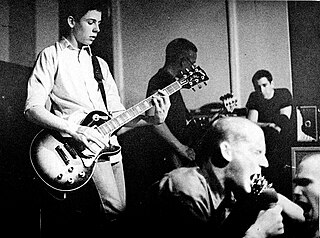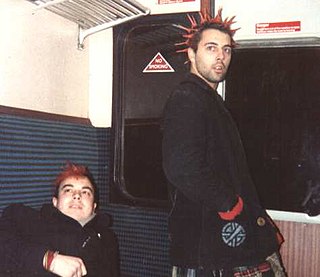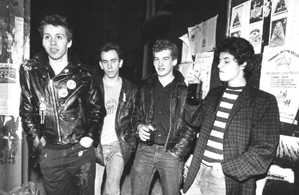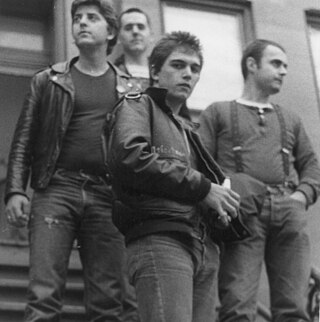Related Research Articles

Minor Threat was an American hardcore punk band, formed in 1980 in Washington, D.C. by vocalist Ian MacKaye and drummer Jeff Nelson. MacKaye and Nelson had played in several other bands together, and recruited bassist Brian Baker and guitarist Lyle Preslar to form Minor Threat. They added a fifth member, Steve Hansgen, in 1982, playing bass, while Baker switched to second guitar.

Hardcore punk is a punk rock music genre and subculture that originated in the late 1970s. It is generally faster, harder, and more aggressive than other forms of punk rock. Its roots can be traced to earlier punk scenes in San Francisco and Southern California which arose as a reaction against the still predominant hippie cultural climate of the time. It was also inspired by Washington D.C. and New York punk rock and early proto-punk. Hardcore punk generally disavows commercialism, the established music industry and "anything similar to the characteristics of mainstream rock" and often addresses social and political topics with "confrontational, politically-charged lyrics."
Emo is a rock music genre characterized by an emphasis on emotional expression, sometimes through confessional lyrics. It emerged as a style of post-hardcore from the mid-1980s hardcore punk movement in Washington, D.C., where it was known as emotional hardcore or emocore and pioneered by bands such as Rites of Spring and Embrace. In the early–mid 1990s, emo was adopted and reinvented by alternative rock, indie rock and/or punk rock bands such as Sunny Day Real Estate, Jawbreaker, Weezer, Cap'n Jazz, and Jimmy Eat World, with Weezer breaking into the mainstream during this time. By the mid-1990s, bands such as Braid, the Promise Ring, and the Get Up Kids emerged from the burgeoning Midwest emo scene, and several independent record labels began to specialize in the genre. Meanwhile, screamo, a more aggressive style of emo using screamed vocals, also emerged, pioneered by the San Diego bands Heroin and Antioch Arrow. Screamo achieved mainstream success in the 2000s with bands like Hawthorne Heights, Silverstein, Story of the Year, Thursday, the Used, and Underoath.

Punk fashion is the clothing, hairstyles, cosmetics, jewellery, and body modifications of the punk counterculture. Punk fashion varies widely, ranging from Vivienne Westwood designs to styles modeled on bands like The Exploited to the dressed-down look of North American hardcore. The distinct social dress of other subcultures and art movements, including glam rock, skinheads, rude boys, greasers, and mods have influenced punk fashion. Punk fashion has likewise influenced the styles of these groups, as well as those of popular culture. Many punks use clothing as a way of making a statement.

Ian Thomas Garner MacKaye is an American singer, musician, songwriter, record producer, and archivist. Active since 1979, he is best known as the co-founder and owner of Dischord Records, a Washington, D.C.-based independent record label and the frontman of hardcore punk band Minor Threat and post-hardcore band Fugazi. MacKaye was also the frontman for the short-lived bands The Teen Idles, Embrace, and Pailhead, a collaboration with the band Ministry. MacKaye is a member of The Evens, a two-piece indie rock group he formed with his wife Amy Farina in 2001 and in 2018 formed the band Coriky with Farina and his Fugazi band mate Joe Lally.

Out of Step is the sole studio album by American hardcore punk band Minor Threat. It was released on 45 RPM vinyl in April 1983 through Dischord Records. Although Out of Step has only been released on CD in limited quantities, it has been repressed on vinyl as recently as 2010, and all tracks from the album are available on Minor Threat's 1989 compilation album Complete Discography.
Digital hardcore is a fusion genre that combines hardcore punk with electronic dance music genres such as breakbeat, techno, and drum and bass while also drawing on heavy metal and noise music. It typically features fast tempos and aggressive sound samples. The style was pioneered by Alec Empire of the German band Atari Teenage Riot during the early 1990s, and often has sociological or far-left lyrical themes.

Brian Baker is an American punk rock musician. He is best known as one of the founding members of the hardcore punk band Minor Threat, and as a guitarist in Bad Religion since 1994. In Minor Threat, he originally played bass guitar before switching to guitar in 1982 when Steve Hansgen joined the band, and then moved back to bass after Hansgen's departure. He also founded Dag Nasty in 1985, was part of the original line-up of Samhain, and has had stints in Doggy Style, The Meatmen, Government Issue, and Junkyard.

The Teen Idles were an American hardcore punk band formed in Washington, D.C. in September 1979. Consisting of teenagers Nathan Strejcek, Geordie Grindle, Ian MacKaye and Jeff Nelson, they recorded two demo sessions and the 1980 Minor Disturbance EP before breaking up in November 1980. The influential independent record label Dischord Records was originally created with the sole purpose of releasing The Teen Idles Minor Disturbance 7" record. They were an early landmark in the D.C. hardcore movement, and MacKaye and Nelson would later form the seminal punk rock outfit Minor Threat.
Youth crew is a music subculture of hardcore punk, which was particularly prominent during the New York hardcore scene of the late 1980s. Youth crew is distinguished from other punk styles by its optimism and moralistic outlook. The original youth crew bands and fans were predominantly straight edge and vegetarian or vegan.
Post-hardcore is a punk rock music genre that maintains the aggression and intensity of hardcore punk but emphasizes a greater degree of creative expression. It was initially inspired by post-punk and noise rock. Like post-punk, the term has been applied to a broad constellation of groups. Post-hardcore began in the 1980s with bands like Hüsker Dü and Minutemen. The genre expanded in the 1980s and 1990s with releases by bands from cities that had established hardcore scenes, such as Fugazi from Washington, D.C. as well as groups such as Big Black and Jawbox that stuck closer to post-hardcore's noise rock roots. In the early, including mid, 2000s, post-hardcore achieved mainstream success with the popularity of bands like My Chemical Romance, Dance Gavin Dance, AFI, Underoath, Hawthorne Heights, Silverstein, The Used, At the Drive-In, Saosin, and Senses Fail. In the 2010s, bands like Sleeping with Sirens and Pierce the Veil, both of which being labeled as post-hardcore, achieved mainstream success. Meanwhile, bands like Title Fight and La Dispute experienced underground popularity.

Limp Wrist is an American punk rock band, who formed in 1998. Featuring members of Los Crudos, Hail Mary, Devoid of Faith, By the Throat, and Kill the Man Who Questions, the band plays short, fast hardcore music, and covers themes concerning the gay community in their live performances and lyrics. They are an openly gay band and they identify as part of the "queercore" punk subculture. The band declared in Frontiers magazine, "We put the 'core' back in 'Queercore'". The band are featured on the cover of My Brain Hurts, Liz Baillie's comic about queer teenagers in New York City.

Washington, D.C. hardcore, commonly referred to as DC hardcore, sometimes referred to in writing as harDCore, is the hardcore punk scene of Washington, D.C. Emerging in late 1979, it is considered one of the first and most influential punk scenes in the United States.
Los Crudos is an American hardcore punk band from Chicago, Illinois active from 1991 to 1998 and from 2006 onward. Comprising all Latino members, the band paved the way for later Spanish-speaking punk bands in the United States and helped to increase the presence of Latinos in the country's predominantly white punk subculture.

The Effigies were an American punk band from Chicago, Illinois, United States. The band played its first show in 1980 and was active initially for approximately a decade, undergoing multiple personnel changes with frontman John Kezdy the only constant, before disbanding in 1990. The band released 5 albums and several EPs, most on the record label they founded in 1981, Ruthless Records, which was distributed by Enigma. Later albums were on the Fever Records and Roadkill Records labels. They toured the U.S. and Canada and played notable venues, including CBGB, Maxwell's, First Avenue (nightclub), Mabuhay Gardens, Paycheck's (Detroit), Exit (Chicago) and The Rathskeller, among others. They also received a significant amount of national airplay on college radio at a time when it was the only medium for alternative music.
Since the mid-1970s, California has had thriving regional punk rock movements. It primarily consists of bands from the Los Angeles, Orange County, Ventura County, San Diego, San Fernando Valley, San Francisco, Fresno, Bakersfield, Alameda County, Sacramento, Lake Tahoe, Oakland and Berkeley areas.

Martin Sorrondeguy is the singer of American hardcore bands Los Crudos and Limp Wrist, the founder of the DIY record label Lengua Armada Discos, and a prominent figure in both the straight edge scene and the queercore scene. He currently does vocals in the band Needles.
Lengua Armada Discos is an American punk and hardcore independent record label run by Limp Wrist/Los Crudos frontman and prominent figure in both the straight edge scene and the queercore scene, Martin Sorrondeguy. It features such bands as Look Back and Laugh, Charles Bronson, Severed Head of State and Sin Orden.
A number of overlapping punk rock subgenres have developed since the emergence of punk rock in the mid-1970s. Even though punk genres at times are difficult to segregate, they usually show differing characteristics in overall structures, instrumental and vocal styles, and tempo. However, sometimes a particular trait is common in several genres, and thus punk genres are normally grouped by a combination of traits.
Beatdown hardcore is a subgenre of hardcore punk with prominent elements of heavy metal. Beatdown hardcore features aggressive vocals, down-tuned electric guitars, gang vocals, heavy guitar riffs, and heavy breakdowns. The genre emerged in the late 1980s and early 1990s with bands such as Killing Time, Madball, and Sheer Terror. In the mid-late 1990s and early 2000s, many other beatdown bands emerged, such as Hatebreed, Bulldoze, Shai Hulud, and Strife. Bands such as Terror and Death Before Dishonor gained cult followings in the mid–late 2000s. New York hardcore bands such as Agnostic Front, Warzone, Sick of It All, and Cro-Mags and the thrash metal subgenre crossover thrash paved the way for beatdown.
References
- ↑ "Feature: Interviews – Look Back And Laugh". Scenepointblank.com. Retrieved September 24, 2020.
- ↑ "Archived copy". Archived from the original on June 12, 2011. Retrieved February 25, 2010.
{{cite web}}: CS1 maint: archived copy as title (link) - ↑ "Lesser of Two music, videos, stats, and photos". Last.fm. Retrieved September 24, 2020.
- 1 2 Crumsho, Michael. "No Ambition, No Problem". East Bay Express . Retrieved September 24, 2020.
- ↑ "Archived copy". Archived from the original on August 11, 2008. Retrieved February 24, 2010.
{{cite web}}: CS1 maint: archived copy as title (link)